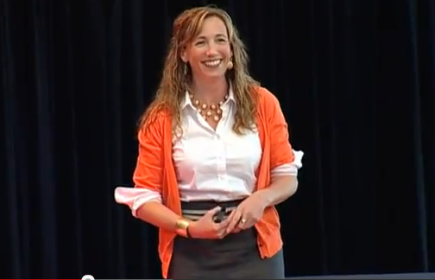Below is the TEDx talk I gave in June—enjoy! (And Happy Halloween, all!)
I’m not sure I fully understood how completely different the world is now compared to the world that I grew up in until one moment several years ago on a school night in a supermarket at 5:15 pm where I was shopping with my two small children. Two small children, I might add, who were misbehaving.
Now, every parent knows that you don’t go grocery shopping with your kids at dinnertime, when everyone is cranky and hungry and tired and the lines are really long.
But, being parenting expert and all, I must have figured that I could tempt fate in this way, that I’d be able to handle both kids and the grocery list at the end of a long day.
Fiona, my daughter who was then about 7, was systematically pulling sugary-cereals off the grocery store shelves and dumping them into our cart, which is sort of funny because before I was a sociologist I worked in marketing for Cap’n Crunch, and Fiona’s behavior was pretty much what we were going for.
Anyway, I wasn’t so happy when she wouldn’t stop doing this, and so I used an old technique of my mother’s that my brother and I used to call the “grocery store grab:” I grabbed her arm just above her elbow, gave it a good hard squeeze, looked her in the eye, and told her in no uncertain terms to KNOCK. IT. OFF.
Now, when my mom would do this to my brother and I, it totally worked. We knew we had pushed the limits, and if we didn’t quit it right then, we were going to be in really big trouble.
My daughter, on the other hand, didn’t exactly have this reaction.
She glared at me, mouth open in shock, and started to yell at the top of her lungs:
YOU ARE HURTING MY BODY!
WHY WOULD A MOTHER HURT HER CHILD’S BODY?!
MOMMY! USE. YOUR. WORDS.
Fiona was illustrating for me and everyone in the grocery store much of what had changed about the world in the span of one generation. Our concepts of authority. The fact that someone could witness this and start tweeting about it, forever ruining my reputation as a parenting expert.
Clearly what worked for my mother was not going to work for me.
Now, I want to back up and tell you that I had, and still have, a GREAT mother. I was born an anxious child, and I gave my also-anxious mother even more to worry about. I was so shy and so easily frustrated that I cried pretty much every day in school until I was halfway through 2nd grade.
Eventually, though, I blossomed into a teacher-pleasing and surprisingly out-going kid. By the time I was 28, I had become an over-achieving, tightly-wound, bossy, pregnant, perfectionist.
Knowing that something had to give, I took up happiness the way that normal people decide to learn a new language. My best friend wanted to learn how to speak Spanish fluently; I wanted to be more fluent in happiness.
I embarked on my new study of happiness from an academic angle, working at UC Berkeley with the best people I could find. I wanted to know what types of people were happy and why. I wanted to know their habits and beliefs; how they were raised and what types of jobs they had.
It wasn’t just a fleeting or superficial interest: I wrote a doctoral dissertation about the sociology of happiness in childhood. In the same way that my own mother rigged my schooling so that I always got all the good teachers, I wanted to rig my children’s lives so that they would be happy, rather than anxious and stressed out like me.
What I learned is that happiness is better thought of as a skill, or a set of skills than it is an inborn personality trait. That it is something that you can teach and practice with your kids.
I also learned what my daughter would illustrate for me so beautifully 7 years later in the supermarket: that in order to be happy, we need to practice compassion. Fiona wasn’t just used to my compassion: she expected it. She was shocked by my old-school parenting moment, one that put authority before empathy.
Old-school parenting and teaching, just like achievement, is all about rank and hierarchy and power. There are winners and losers. There is obedience, but not a lot of questioning.
Compassionate parenting, on the other hand, is about empathy and dialogue. It is about listening and feeling. For those of you who have seen Jill Bolte Taylor’s TED talk, it is about parenting from our right brain.
I believe that there is a terrible tension in the world right now between this old-school of hierarchy and achievement and a new culture that values what I’ll call the compassionate imagination.
Many of our kids are very, very stressed out. Half of our college kids struggle with depression. A quarter of high school/college girls have been diagnosed with an eating disorder, depression, or clinical levels of anxiety. Suicide is the 3rd leading cause of death among kids aged 10 to 24.
We SAY that we just want our children to be happy. But as a culture we ACT as though we just want our children to achieve and perform.
Whether we intend to or not, we are pressuring our kids to achieve and perform, to be superstars in school and sports and the arts—and it isn’t working. They can’t all go to Ivy League colleges or be professional athletes or win American Idol. And even if they could, those things wouldn’t make them happy.
So what we have here, people, is a choice.
We can choose to raise children who are obsessed with their academic and athletic achievements, their perfection, their potential celebrity, and how incredibly well they reflect on us, our parents and teachers. We can give them grades, and rank them against each other, and tell them not to be nervous when we force them to take standardized tests. We can work them to the bone.
OR, we can choose to raise children that know in their heart of hearts that we value their kindness and their character over their academic achievements.
We can teach them how to really feel what they are feeling, right now in the present moment, so that they might also have the ability to actually feel, using their minds, what it is like to be another human being.
Let’s not forget that the world is teaching our kids how to ignore their feelings: with alcohol and food, with Facebook and busyness, with a trip to the mall. They will not need us to teach them how to numb themselves—they will learn this on their own. But they do need us to teach them how to help their compassionate imaginations thrive.
What I would like to leave you with today is the idea that our own happiness, and the happiness of our children, can be predicted by how well we make this choice between teaching compassion and letting kids believe, rightly or wrongly, that we value their achievements above everything else.
I am not suggesting that we abandon regular schooling and throw kids full-time into community service projects. But I do believe that we need a massive cultural shift in our values, from an ever-narrowing focus on achievement to an ever-widening focus on what it means to live a life filled with compassion.
Which DO you choose? And how will you show the children in your life what you’ve chosen? How will YOU teach compassion?
I believe that this is a question that can change the world.
—-
© 2011 Christine Carter, Ph.D.
Become a fan of Raising Happiness on Facebook.
Follow Christine Carter on Twitter
Sign up for the Raising Happiness monthly newsletter.



Comments